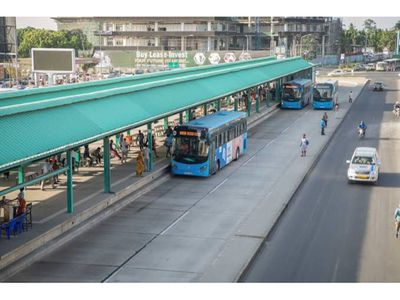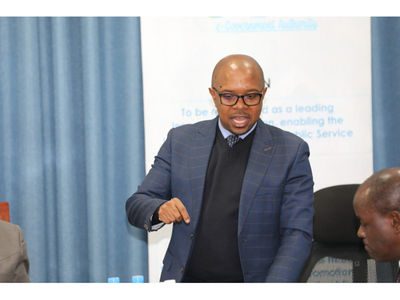…Reason for no syndicated loan
Details are beginning to emerge, as to why the Ghana Cocoa Board (COCOBOD), is having difficulties getting this year’s Cocoa Syndicated Loan from the European Banks.
The Herald’s information is that, COCOBOD, has among other things, failed to pay the final instalment of US$87 million of last year’s Syndicated Loan to the international banks, leading to mistrust between the Ghanaian entity and European financial institutions.
The International Banks, have lost confidence in Joseph Boahen Aidoo-led COCOBOD and the Akufo-Addo government. They are not ready to dish out their money, afraid that the government will divert the money into other things, especially to win an election, instead of buying and supplying cocoa beans.
What is compounding the COCOBOD’s troubles is President Nana Akufo-Addo’s reported claim to some of the banks that the COCOBOD, was a private company, although the banks are aware the he had brought down his in-law; Emmanuel Ray Ankrah and made him,Deputy Chief Executive Officer (CEO) Finance & Administration, and he decides who gets paid when and how.
“The current COCOBOD under Boahen Aidoo is seen by the European Banks as terribly dishonest”, said a COCOBOD source, revealing that the European banks are also of some senseless procurements by the management sometimes at inflated cost hence finding it very risky to give the institution more money.
Interestingly, the Minister of Finance, Dr Mohammed Amin Adam, has stated that the country’s cocoa regulator, COCOBOD, is still in talks with foreign lenders to raise a syndicated loan to fund the next crop season.
According to him, COCOBOD, has not completely abandoned the entire cocoa syndication loan program.
“COCOBOD is not abandoning the cocoa syndication. Negotiations are ongoing, but it will not bring in more than US$600 million out of an initial target of US$1.5 billion,” Dr Amin Adam is quoted to have said by Bloomberg during an interaction with journalists in Accra on Monday, August 26, 2024.
He indicated that, the inability to achieve this funding target, has led COCOBOD to seek alternative sources of funding.
The update by the finance minister, comes after COCOBOD announced last week that it was breaking away from a 32-year tradition of seeking funds from international banks for the annual cocoa crop season to adopt a method of self-reliance at the start of the 2024/2025 cocoa crop season in September 2024.
The CEO of COCOBOD, Mr Boahen Aidoo, explained that the decision to move away from seeking syndicated loans from external sources, is part of a broader strategy towards self-reliance and reducing dependency.
In June this year, Ghana’s cocoa production output reached 429,323 metric tons at the end of the harvest, according to data released by COCOBOD.
This is less than 55 per cent of the average seasonal output with the decline being attributed to disastrous harvests caused by poor weather conditions, swollen pod disease, and illegal mining activities in cocoa-growing areas.
These developments have not only disrupted COCOBOD’s operations but have impacted the supply value chain, pushing prices for cocoa beans up on the international market.
In the midst of the COCOBOD’s woes, a group calling itself the Concerned Farmers Association of Ghana (CFAG) has sounded the alarm over the deteriorating financial state of the institution, which has placed the nation’s cocoa industry in a precarious situation.
In this regard, the CFAG is urging a declaration of a state of emergency, further urging the government, stakeholders, and the international community to act swiftly to prevent the collapse of this vital industry.
Farmer General, Nana Oboadie Boateng Bonsu, the convener of the CFAG made this call in a statement dated Thursday, August 22, 2024
“COCOBOD, the body responsible for purchasing cocoa from farmers, is reportedly facing severe financial challenges, leaving it unable to fulfil its obligations. This situation poses a grave threat to the livelihoods of over 800,000 cocoa farmers, many of whom depend on cocoa farming as their primary source of income,” the statement said.
According to the statement, the inability of COCOBOD to purchase cocoa due to a lack of funds could have devastating consequences for the entire industry, which contributes significantly to Ghana’s economy.
The International Cocoa Organization (ICCO) explains that Ghana’s cocoa industry accounts for approximately 20% of the country’s GDP. The average income for a cocoa farmer in Ghana is estimated at GHS 2,500 (approximately US$400) per annum, according to a 2020 study by COCOBOD.
The current financial crisis, therefore, threatens not only the farmers’ livelihoods but also the broader economic stability of the country’ the statement said.
In response to this urgent situation, the CFAG is advocating for the establishment of a Cocoa Bank, funded by a nationwide fundraising campaign aimed at raising $5 billion.
This Cocoa Bank would provide the necessary financial resources to purchase cocoa from farmers, ensuring they receive fair prices for their produce and stabilizing the industry in the process.
The CFAG is calling on the government, all political parties, stakeholders, and the international community to rally behind this initiative.
The association has requested that all political parties temporarily halt their campaign activities to focus on addressing this crisis.
CFAG believes that a united effort is crucial to safeguard the future of Ghana’s cocoa industry and protect the livelihoods of those who depend on it.
The management of COCOBOD, had claimed it invested almost a billion cedis last year to rehabilitate aged cocoa farms and those ravaged by swollen shoot diseases to help increase national production in the short to medium term.
Boahen Aidoo, had noted that the initiative was part of efforts to sustain cocoa production and the livelihoods of farmers, and was, therefore, confident that the country would produce more than 800,000 metric tons of cocoa in the 2024/25 season that opens in September.
The CEO and his deputy in charge of Finance and Administration, Ray Ankrah, were reacting to media reports that COCOBOD’s administrative expenses rose to GH¢3.4 billion last year when cocoa production fell.
Mr. Aidoo said the money was used to fund the cutting down of diseased and aged farms, nurse, and plant seedlings as well as maintain the rehabilitated farms before handing them over to farmers across the country.
He said this strategic investment in farmers and farms led to the board’s administrative cost increasing to GH¢3.4 billion in 2023.
Therefore, Mr Aidoo said it was misleading for people to suggest that COCOBOD spent GH¢3.4 billion at its head office last year when a chunk of the funds was used to support cocoa production and the welfare of the crop farmers.
The Deputy CEO in charge of Finance and Administration said the misleading report was in spite of a detailed explanation provided in the board’s audited accounts.
“I think it’s deliberate to cause public disaffection because our audited accounts and the Auditor General’s report as captured in the 2023 financials show clearly that, included in the administrative cost is a GH¢943 million expense incurred on our productivity enhancement programmes (PEPs).”
“The GH¢943 million was actually used to rehabilitate diseased and moribund farms to sustain the livelihood of the affected farmers and increase cocoa production, starting with the 2024/25 season,” Mr Ankrah said.
He explained that but for that one-off expenditure, which he said was funded from a loan secured from the African Development Bank (AfDB), the administrative cost actually reduced in 2023.
The post COCOBOD’s bosses hide US$87 million debt owed European banks appeared first on The Herald ghana.




